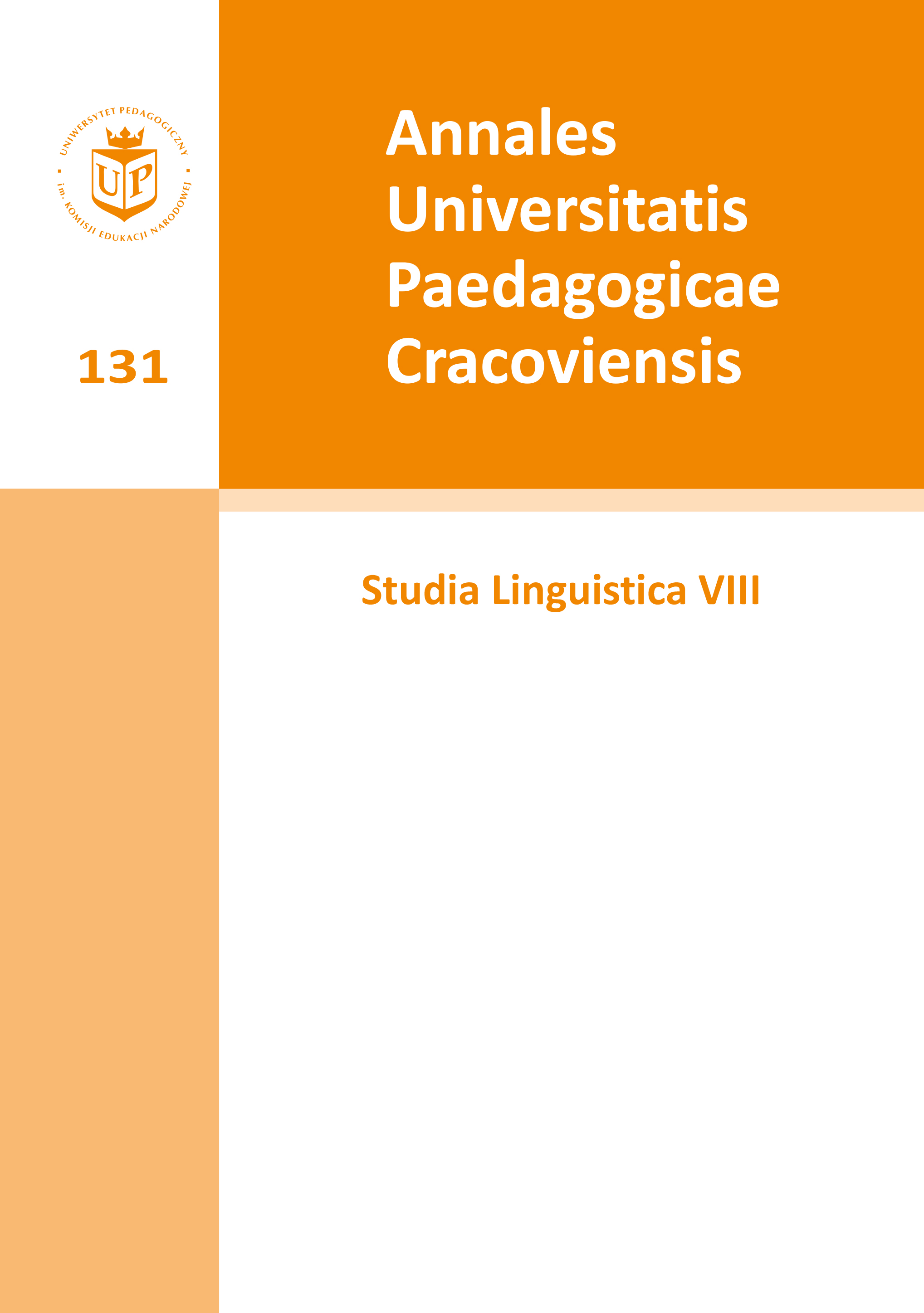Mieć miedziane / wytarte czoło – pochodzenie i losy frazeologizmu na tle pokrewnych konstrukcji w języku polskim
Main Article Content
Abstract
The aim of the article is a linguistic description of the set phrase mieć miedziane / wytarte czoło (to have a copper / worn forehead - ‘to lack ambition’). The author points to its peculiar etymology and to its formal and semantic status in the older and contemporary phraseographic works as well as in the Polish language corpora. The analysis of the history of this expression has been carried out in the context of related Polish phraseological units. The article presents essential facts concerning the mechanisms of the functioning of selected language forms. These facts may come useful in the process of compiling new lexicographic works.
Downloads
Article Details

This work is licensed under a Creative Commons Attribution-NonCommercial-NoDerivatives 4.0 International License.
Author, submitting a text to the editorial board of the journal “Annales Universitatis Paedagogicae Cracoviensis. Studia Linguistica", certifies that the content of the article has not been published so far and that the work does not violate in any way the copyright or related rights of other person, as well as other rights of third parties, and that no one's rights to the work (or any part thereof) have been missed. After signing the contract, the property rights to the published materials are transferred to the University of the National Education Commission, Krakow.
“Annales Universitatis Paedagogicae Cracoviensis. Studia Linguistica” is an open access journal, and all its content is made available free of charge to users and institutions under the Creative Commons CC-BY-NC-ND 4.0 license (attribution, non-commercial use, no derivative works). Under this license, the authors agree that their work may be lawfully reused for any purpose, except for commercial purposes, without the prior consent of the author or publisher. Everyone can read, download, copy, print, distribute and process these works, provided that the author's marking and the original publication place are correct. Published texts may not be used to create derivative works (e.g. to translate and publish in another language without the consent of the publisher). This is in line with the BOAI (Budapest Open Access Initiative) definition. "Studia Linguistica" does not charge for submitting or processing articles.
References
Biblia Tysiąclecia, 1971, Pismo Święte Starego i Nowego Testamentu. W przekładzie z języków oryginalnych opracował zespól biblistów polskich z inicjatywy benedyktynów tynieckich, wyd. 2 zmienione, Poznań – Warszawa.
Google Scholar
Gloger Z., 1985, Encyklopedia staropolska ilustrowana, t. I–IV, wyd. 5, Warszawa.
Google Scholar
Godyń J., 2006, Od Adama i Ewy zaczynać. Mały słownik biblizmów języka polskiego, wyd. 2 poprawione, uzupełnione i rozszerzone, Warszawa.
Google Scholar
Koziara S., 2004, O frazeologii biblijnej nie zawsze biblijnego pochodzenia, [w:] Studia nad polszczyzną współczesną i historyczną. Prace dedykowane Profesorowi Stanisławowi Bąbie w 65-lecie urodzin, red. J. Liberek, Poznań, s. 159–166.
Google Scholar
Koziara S., 2008, Wokół semantyki i genezy frazeologizmu od stóp do głów, „Annales Academiae Paedagogicae Cracoviensis”, Studia Linguistica”, t. III, red. T. Szymański, E. Stachurski, S. Koziara, Kraków, s. 177–182.
Google Scholar
Koziara S., 2009a, Frazeologia biblijna w języku polskim, wyd. 2 poprawione, Łask.
Google Scholar
Koziara S., 2009b, Tradycyjne biblizmy a nowe polskie przekłady Pisma Świętego (ujęcie filologiczno-normatywne), Kraków.
Google Scholar
Koziara S., 2010, Biblizmy frazeologiczne w zasobach współczesnej polszczyzny, [w:] Perspektywy współczesnej frazeologii polskiej. Teoria. Zagadnienia ogólne, red. S. Bąba, K. Skibski, M. Szczyszek, Poznań, s. 99–119.
Google Scholar
Koziara S., 2011, O rodzimych frazeologizmach biblijnych „chodzących krętymi ścieżkami”, „Annales Universitatis Paedagogicae Cracoviensis”, „Studia Logopaedica”, t. IV, red. L. Bednarczuk, S. Koziara, H. Pawłowska-Jaroń, E. Stachurski, Kraków, s. 287–293.
Google Scholar
Oleśkiewicz A., 2007, Europa języków. Związki frazeologiczne o proweniencji biblijnej i antycznej w europejskiej wspólnocie słownikowej, Kraków.
Google Scholar
Pajdzińska A., 2001, O znaczeniu związku frazeologicznego (raz jeszcze), [w:] Problemy frazeologii europejskiej, red. A.M. Lewicki, t. 4, Lublin, s. 11–18.
Google Scholar
Piela M., 2003, Grzech dosłowności we współczesnych polskich przekładach Starego Testamentu, Kraków.
Google Scholar
Skorupka S., 1952, Z zagadnień frazeologii, „Sprawozdania z Posiedzeń Komisji Językowej Towarzystwa Naukowego Warszawskiego. Wydział I Językoznawstwa i Historii Literatury”, t. IV, Warszawa, s. 147–180.
Google Scholar
Tyrpa A., 2005, Frazeologia somatyczna. Związki frazeologiczne o znaczeniach motywowanych cechami części ciała w gwarach polskich, wyd. 2, Łask.
Google Scholar
Walczak B., 1985, Biblia a język. O warstwie biblijnej w polskiej frazeologii, „Życie i Myśl”, nr 11–12, s. 28–39.
Google Scholar
